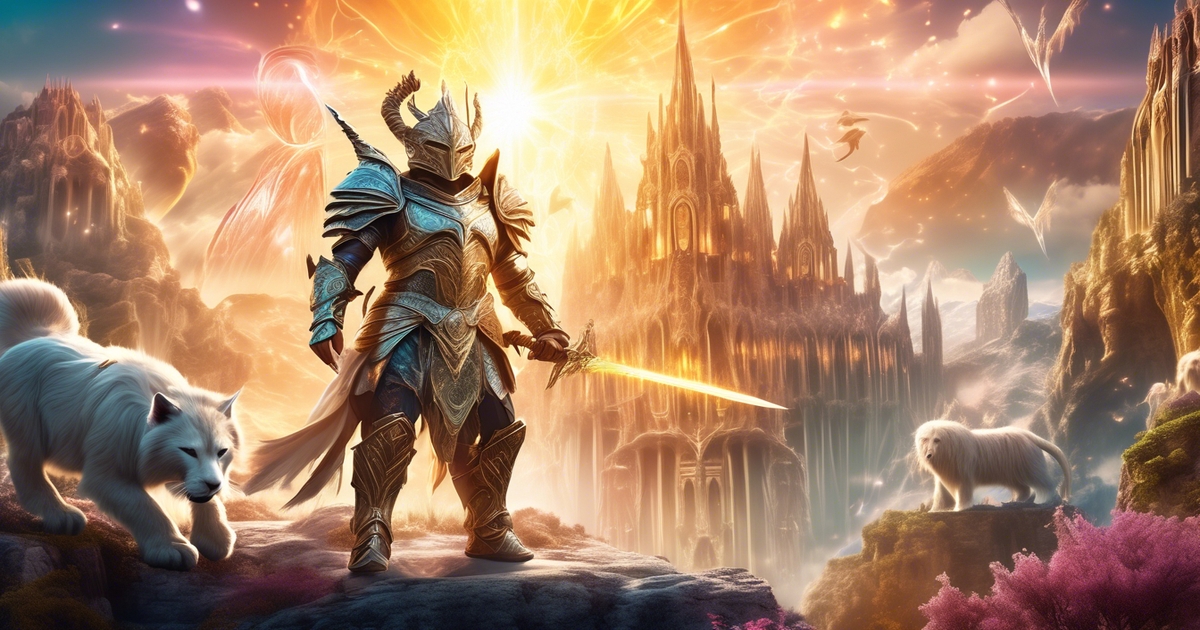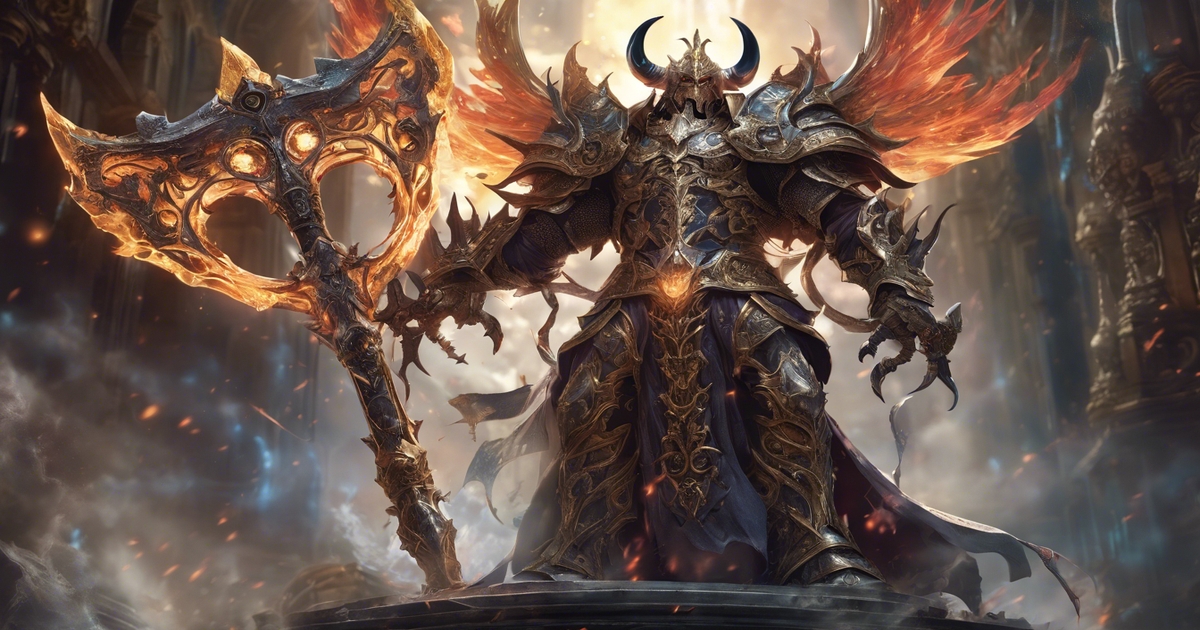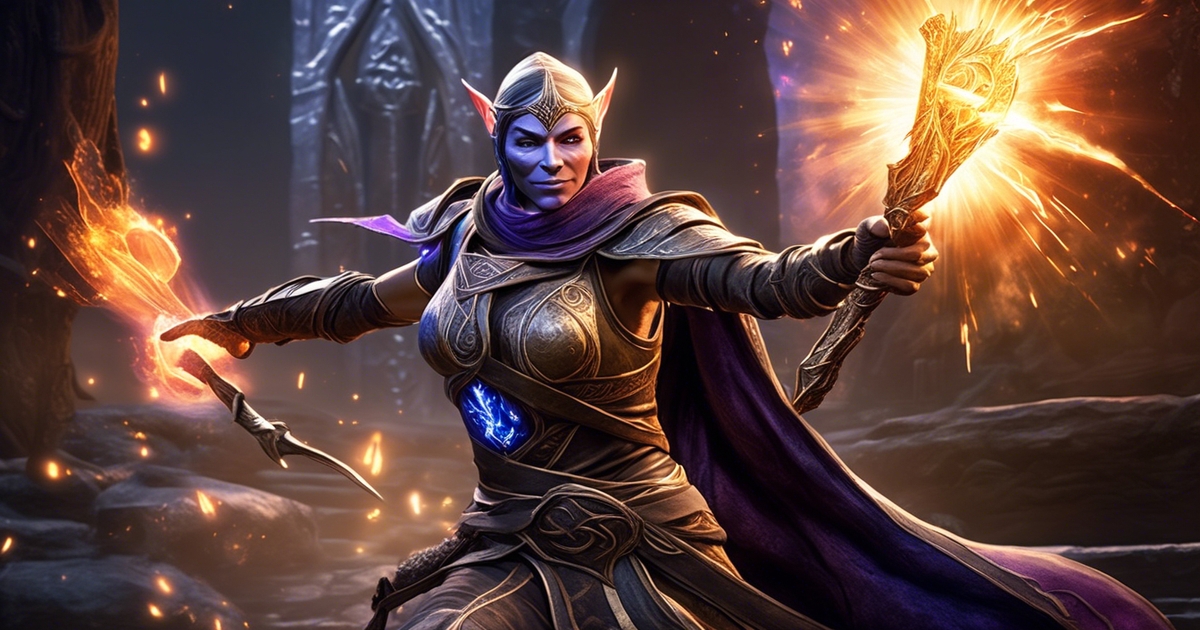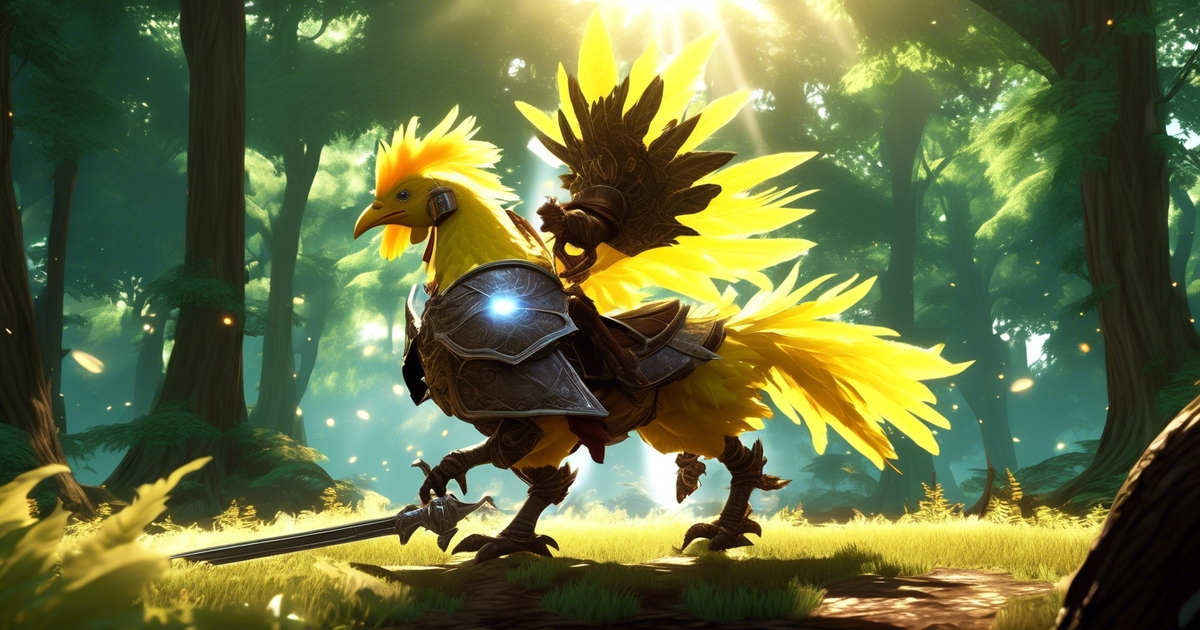What Is MMORPG: Characteristics, Top Games, and More

Did you know that there are over 100 million MMORPG players worldwide? These massively multiplayer online role-playing games offer an immersive experience, allowing players to interact in vast virtual worlds.
With stunning 3D graphics and numerous servers, many MMORPGs like World of Warcraft and EVE Online have captured the attention of gaming enthusiasts. Whether delving into dungeons or engaging in epic battles, MMORPGs provide a unique online gaming environment that has taken the video game world by storm.
In this article, we’ll go over everything you should know about MMORPGs.
What is MMORPG
Definition
MMORPG, which stands for Massively Multiplayer Online Role-Playing Game, is a type of online game where thousands of players interact with one another in a virtual world. Players assume fictional characters and embark on adventures within these games.
Gameplay Emphasis
In MMORPGs, the emphasis lies in cooperative gameplay and character development. Players work together to achieve goals, defeat enemies, and complete quests in a persistent online world. The games allow for extensive customization of characters and progression through various levels of skills and abilities.
The appeal of MMORPGs lies in the immersive experience they offer, allowing players to escape into a fantasy realm where they can socialize with others, engage in epic battles, and undertake heroic quests. These games provide an opportunity for players to create their own stories within a vast virtual universe.
History and Evolution of MMORPGs
The first graphical MMORPG emerged in the late 1990s, marking a significant shift from text-based MUDs to visually immersive virtual worlds. This transition revolutionized the gaming landscape, captivating players with rich, interactive experiences.
Major technological advancements have played a pivotal role in shaping the evolution of MMORPGs. The introduction of high-speed internet and advanced graphics capabilities has enabled developers to create expansive, intricately detailed game environments that offer an unparalleled level of immersion.
For instance, “Star Wars: The Old Republic” showcases how MMORPGs have evolved to prioritize storytelling and player experience. The game presents an extensive narrative-driven gameplay experience that rivals traditional single-player RPGs, illustrating the genre’s progression towards delivering compelling storylines within a massively multiplayer framework.
Characteristics of MMORPGs
Questing, Leveling, and Combat
MMORPGs are known for their quest-driven gameplay, where players embark on various missions to earn rewards, experience points, and progress through the game. Leveling up characters by gaining experience points is a fundamental aspect of MMORPGs. Engaging in combat with monsters or other players is a common feature that adds excitement and challenge to the gaming experience.
Crafting, Trading, and Guilds
In MMORPGs, players have the opportunity to engage in crafting activities to create items such as weapons, armor, or potions. Trading with other players for resources or items is also a prevalent aspect of these games. Moreover, forming guilds or groups allows players to collaborate and tackle more challenging quests or battles together.
Character Customization and Skill Progression
One of the captivating elements of MMORPGs is the extensive character customization options available to players. From choosing appearances to selecting classes or professions, players can tailor their avatars according to their preferences. Furthermore, skill progression systems enable characters to develop new abilities or enhance existing ones as they advance through the game.
MMORPG vs RPG
Larger Number of Players
MMORPGs involve a larger number of players compared to traditional RPGs. In MMORPGs, thousands or even millions of players can simultaneously interact within the game world.
Persistent Virtual World
In MMORPGs, players interact in a persistent virtual world, unlike in single-player or small multiplayer RPGs. The game world continues to exist and evolve even when a player logs off, creating an immersive and dynamic environment.
Features and Gameplay
MMORPGs often feature guilds, dungeons, and a vast game world for players to explore. These games offer extensive customization options for characters, diverse quest lines, and various social interactions among players.
In massively multiplayer online role-playing games (MMORPGs), such as “World of Warcraft” and “Guild Wars,” gamers experience an expansive virtual realm with endless possibilities. Unlike traditional RPGs like “The Elder Scrolls V: Skyrim,” where the player’s experience is confined to their own gameplay session, MMORPGs provide a living virtual universe that thrives on continuous interaction among numerous players. Dungeons in MMORPGs are not mere challenges for individual players but rather collaborative experiences where groups strategize and work together to overcome formidable foes.
| Feature | MMORPG | MMO |
|---|---|---|
| Player vs Player | Yes | Yes |
| Quests | Main focus | Optional |
| Character | Customization | Limited options |
| World | Persistent | Instance-based |
| Gameplay | Story-driven | Open-ended |
| Combat | Tactical | Action-based |
MMORPG vs MMO
MMOs, or massively multiplayer online games, encompass a wide array of online multiplayer games. These can include various genres such as shooters, strategy games, and role-playing games. On the other hand, MMORPGs specifically focus on role-playing elements within the multiplayer environment.
In an MMO game, players can engage in a variety of activities with numerous other players simultaneously. This could involve cooperative gameplay, player versus player combat, or even trading and socializing within the virtual world. The term “MMO” is more of an umbrella term that covers any game with a large number of simultaneous players interacting in a shared world.
Conversely, MMORPGs are a subset of MMOs that emphasize immersive storytelling and character development through role-playing mechanics. Players assume the roles of fictional characters within a fantasy or science fiction setting and embark on quests, battles, and exploration while progressing their character’s abilities and equipment.
While both MMOs and MMORPGs offer opportunities for social interaction and collaboration among players from around the globe, MMORPGs provide a deeper emphasis on narrative-driven gameplay and character customization.
| Aspect | MMO | MMORPG |
|---|---|---|
| Definition | Massively Multiplayer Online game | Massively Multiplayer Online Role-Playing Game |
| Gameplay Focus | Wide range of game genres and activities | Primarily focused on role-playing and character development |
| Character Progression | Limited or no character progression | Extensive character customization, leveling, and skill development |
| Storytelling | May or may not have a strong narrative | Emphasis on immersive storytelling and quest-driven gameplay |
| Social Interaction | Limited emphasis on social interaction | Strong focus on socializing, forming guilds, and group activities |
| World Design | Diverse virtual worlds with various themes | Detailed and immersive virtual worlds with lore and history |
| Player Roles | Players may not have defined roles or classes | Players often choose specific roles or classes with unique abilities |
| Examples | Eve Online, Warframe, Destiny | World of Warcraft, Final Fantasy XIV, Elder Scrolls Online |
Most Popular MMORPG Games
Below are the most popular MMORPG games.
1. World of Warcraft
World of Warcraft, often abbreviated as WoW, is a massively multiplayer online role-playing game (MMORPG) that has captivated millions of players worldwide. With its rich lore, diverse character classes, and immersive gameplay, World of Warcraft has remained a top choice for MMORPG enthusiasts. According to TheGamer website, World of Warcraft offers an expansive virtual world with various quests and challenges, making it a beloved choice for gamers seeking adventure and camaraderie.

2. Elder Scrolls Online
Elder Scrolls Online (ESO) is another standout MMORPG that has garnered a dedicated fan base. Set in the iconic Elder Scrolls universe, this game allows players to explore the continent of Tamriel while completing quests and engaging in thrilling battles. Described on TheGamer as an MMORPG that seamlessly combines storytelling with open-world exploration, Elder Scrolls Online provides an immersive experience for both solo and group play.

3. Final Fantasy XIV: A Realm Reborn
Final Fantasy XIV: A Realm Reborn is a revitalized version of the original Final Fantasy XIV game. This MMORPG boasts stunning visuals, an engaging storyline, and dynamic gameplay mechanics. As mentioned on TheGamer’s website, Final Fantasy XIV: A Realm Reborn offers a compelling narrative set in the enchanting world of Eorzea, where players can embark on epic adventures while interacting with a vibrant community.

Social Interaction and Cultural Impact of MMORPGs
MMORPGs, or Massively Multiplayer Online Role-Playing Games, serve as a global platform for social interaction. Players from different corners of the world come together to collaborate, compete, and build communities within these virtual worlds. The impact of MMORPGs extends beyond just entertainment; it influences cultures and economies.
Facilitating Global Social Interaction
MMORPGs act as a melting pot where people from diverse backgrounds converge, forming alliances, and forging friendships. Through real-time communication features like chat, voice chat, and guild systems, players interact with each other regardless of geographical boundaries. This fosters a sense of camaraderie among players who may have never met in person but share common goals within the game.
Influence on Cultural Dynamics
The virtual economies within MMORPGs often mirror real-world economic principles. These player-driven economies can impact the cultural dynamics both inside and outside the game. For instance, in-game events such as festivals or wars can parallel real-world cultural celebrations or conflicts, thereby influencing player perceptions and behaviors.
Extended In-Game Communities
Interestingly, the relationships formed in MMORPGs often extend into players’ lives outside the game. Many players develop long-lasting friendships that transcend the confines of the virtual world. They form bonds through shared experiences within the game that carry over into their offline interactions.
Trends and Future of MMORPG Gaming
Virtual Reality Integration
Virtual reality (VR) integration is revolutionizing the future of MMORPG gaming. With VR, players can immerse themselves in a lifelike digital world, enhancing the overall gaming experience.
Cross-Platform Accessibility and Mobile Adaptations
Cross-platform accessibility and mobile adaptations are reshaping the future landscape of MMORPGs. Players can seamlessly transition between devices, allowing for greater flexibility and convenience.
Dynamic Storytelling and Player-Driven Content Creation
Dynamic storytelling and player-driven content creation are significantly influencing future game design. This trend empowers players to contribute to the evolving narrative of the game, fostering a more engaging and personalized experience.
In the realm of MMORPGs, virtual currency has become an integral part of the in-game economy. Players can earn virtual currency through various in-game activities or purchase it with real money to enhance their gaming experience.
Conclusion on the World of MMORPGs
As you’ve learned, MMORPGs aren’t just games; they’re immersive universes where millions of players forge friendships, conquer challenges, and shape their destinies. From the early days of text-based adventures to the stunning virtual landscapes of today, MMORPGs have evolved into living, breathing worlds that offer endless possibilities.
Now that you understand the allure and significance of MMORPGs, why not embark on your own virtual odyssey? Dive into one of the popular MMORPGs or explore upcoming trends in the gaming industry. Join the thriving communities, experience the thrill of epic quests, and witness firsthand how MMORPGs continue to redefine interactive entertainment. The adventure awaits!
Frequently Asked Questions
What is an MMORPG?
An MMORPG, or massively multiplayer online role-playing game, is a type of video game that allows a large number of players to interact with one another within a virtual world. Players typically create and control characters while engaging in various activities and quests.
How do MMORPGs differ from traditional RPGs?
Unlike traditional RPGs, MMORPGs involve a massive number of players interacting in the same game world simultaneously. This creates a dynamic and ever-changing environment where players can collaborate, compete, and socialize on a much larger scale than in single-player or small-group RPGs.
What are some popular MMORPG games?
Some of the most popular MMORPG games include World of Warcraft, Final Fantasy XIV, Guild Wars 2, The Elder Scrolls Online, and Black Desert Online. These games offer diverse gameplay experiences with expansive worlds and intricate storylines.
How do MMORPGs impact social interaction and culture?
MMORPGs have significantly influenced social interaction by providing platforms for players to connect globally. They have also impacted culture by fostering communities with shared interests, creating economies within the games themselves, and even influencing broader cultural trends through their storytelling and aesthetics.
What does the future hold for MMORPG gaming?
The future of MMORPG gaming looks promising with advancements in technology enabling more immersive virtual worlds. Expect innovations in gameplay mechanics, graphics, artificial intelligence, and virtual reality integration to enhance the overall gaming experience for MMORPG enthusiasts.
